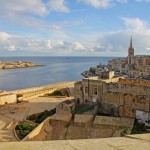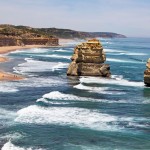South Africa – Mandela & Nomadic Thoughts (13.12.13)
Nelson Mandela, presently lying in state at the Union Buildings in Pretoria, where he was sworn in as South Africa’s president in 1994, will be buried on Sunday in his ancestral home in Qunu.

Nelson Mandela statue Parliament Square, London this week – with mourners & sea of santas. Photographer: Caroline Findlay de Concha, Nomadic Thoughts.
As for so many of my generation, this extraordinary man has been a constant presence in my adult life, as I watched his journey from being a prisoner behind bars all the way to becoming the world’s most respected statesman. His Rainbow State of today, although facing continued difficulties, feels a long way away from the country of yester year. In the main thanks to Madiba, Nelson Mandela.
For example, at Everton’s match (against Arsenal) last Sunday the minute’s applause for his life, like so many other acknowledgments of respect in the last week, was remarkable for its enthusiasm, warmth and sheer volume. It prompted Peter Bond, one of my longest standing friends, to observe that to him, Nelson Mandela was the greatest living man in his 50+ year lifetime. A sentiment many will agree with.
The very fact that so many people of all ages were so touched by Nelson Mandela set me thinking about the time he first came into my life. Although I had embraced the 1980s music scene calling for his release by attending the Free Nelson Mandela Concert at Wembley in June 1988, as well as following ska bands such as The Specials, as a young British white man I had first been introduced to his presence in 1983 when a car bomb exploded in Pretoria on 20th May.

South Africa – as ever, as unforgiving as beautiful.
Having spent almost a year travelling from the north of Africa to South Africa, I hitched across a small Botswana/South Africa border crossing only a few days before. It was a decision I had not taken lightly – although I had travelled through Egypt, The Sudan, Uganda, Rwanda, Kenya, Tanzania, Malawi, Zambia and Botswana I had been only too aware of the pariah status of South Africa in the early 1980s. So much so that as a travelled I referred to South Africa in my diary as Disneyland, for fear of a policeman or border guard searching through my stuff and finding a document with even the words ‘South Africa’ in it. I was motivated to visit South Africa out of curiosity – I had been travelling as a young white man throughout the continent of Africa for nearly a year, often not seeing a fellow traveller for long periods. I wanted to witness apartheid society first hand, as well as seeing what landscape such a huge country had to offer.
The very next day, after I crossed into South Africa, journeying to Johannesburg, the car bomb attack outside the Nedbank Square buildings on Church Street in Pretoria killed 16 people and injured 130 more.
The South African airwaves were in uproar and the white community extremely vocal in condemning Nelson Mandela, who was in prison, for claiming that the Nedbank building was a legitimate target. Although I had grown up in a British military family, very much affected by the terrorist activities attached to the Northern Ireland crisis in the 1970s, I was genuinely taken aback at the reaction I witnessed following this bomb on 20th May 1983.

Robben Island
Every white person I met over the next week seemed to take it upon themselves to re-endorse the fact that Nelson Mandela was a terrorist and that the ANC’s only future was to lead South Africa into a bitter Armageddon-like blood bath. Reiterate how far South Africa has come under the guidance of Nelson Mandela in the last thirty years – on two occasions, after this bombing, white South African’s looked me in the eye and said I was deluded in not appreciating that black people had smaller brains than white people – “it has been medically proven” they claimed.
As I hitch-hiked around the country my awareness of being in such a polarised society continued wherever I went. I was picked up by red-neck Afrikaans farmers, tirading church ministers, Cape coloured van drivers, medics, salesmen, black migrant workers, local African truckers and as I arrived into Cape Town (completing my overland journey from London to the southern tip of Africa) a coach load of drunk Rugby players.
Every single white person I met was welcoming, friendly and happy to share their thoughts on the apartheid system. Every non-white I met was welcoming, friendly and guardedly polite in sharing their views on apartheid.
 As a white man it was obviously difficult to appreciate the true desperation of being a black African living in such a racist society. As I travelled I simply scratched the surface, feeling that their society was as surreal as it was sinister. For example on one occasion when I hitching through the cold Orange Free State night time, I was forced to bed down at 3am on the floor of a deserted filling station toilet floor (the only room with a closed door to the cold night air). I was woken shortly afterwards by a black African security guard telling me I could only sleep in the ‘White Only Toilet’ area. Similarly I sat for twenty minutes on a stationary local train in Cape Town once, only to be finally told that the train could not depart until I had disembarked. It was a ‘Blacks Only’ train.
As a white man it was obviously difficult to appreciate the true desperation of being a black African living in such a racist society. As I travelled I simply scratched the surface, feeling that their society was as surreal as it was sinister. For example on one occasion when I hitching through the cold Orange Free State night time, I was forced to bed down at 3am on the floor of a deserted filling station toilet floor (the only room with a closed door to the cold night air). I was woken shortly afterwards by a black African security guard telling me I could only sleep in the ‘White Only Toilet’ area. Similarly I sat for twenty minutes on a stationary local train in Cape Town once, only to be finally told that the train could not depart until I had disembarked. It was a ‘Blacks Only’ train.
The correlation between my first encountering stories of Nelson Mandela as I travelled through South Africa in 1983, is that it was at this time I was deciding to think about setting up a travel business. In simple terms I wanted to send people to the very destinations I had enjoyed the most. South Africa was about the only place I had visited, to date, that I knew I did not want to send people. Indeed until the formation of modern day South Africa, Nomadic Thoughts did not offer South Africa as a holiday destination.
Subsequent to this I am delighted to now confirm that over the past twenty years we at Nomadic Thoughts have wholeheartedly embraced South Africa as a holiday destination. In addition, whilst offering an exciting diversity of destinations – from wildlife safari & wilderness to Cape Town, Robben Island & coastline – we have been actively involved in local community projects.

Most recently we have supported the TICOS sun-fires stove projects that have successfully benefitted so many South Africans. We offer travelling Nomadic Thoughts clients an opportunity to contribute to the TICOS carbon offset programme, with funds recently supporting the sun-fired stoves projects in South Africa. So many of our clients have supported this project that we are extremely proud of this as an example of how we can, in a small way, contribute to modern day life in South Africa.
One of my abiding community memories in South Africa was when I managed to arrange, on behalf of Nomadic Thoughts, for myself and eight other football coaches to visit the Samara Game Reserve in the Central Karoo area during the 2010 South Africa World Cup Finals.

We ran a day’s coaching for over a hundred local townships children in the open grounds of Samara Game Reserve. In addition to completing a selection of skills coaching seminars we set up a mini World Cup tournament with the children choosing which national teams they wanted to represent. In the end England’s adopted team won our mini World Cup, coached by the only non-English local coach present. The Mayor of Graaff-Reinet stood in for Nelson Mandela during the awards ceremony.

Nomadic Thoughts & Samara World Cup Day.
Suffice to say as holiday destination South Africa is one of Nomadic Thoughts’ favourites in Africa – which is a long way from when I first visited in 1983. Mainly thanks to the actions and sense of forgiveness from Nelson Mandela.
“People must learn to hate, and if they can learn to hate, they can be taught to love, for love comes more naturally to the human heart than its opposite. Man’s goodness is a flame that can be hidden but never explained” Nelson Mandela.







